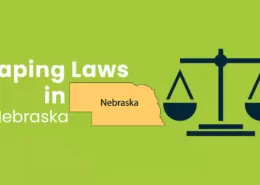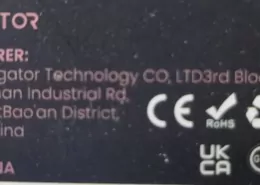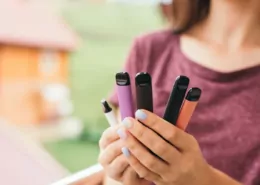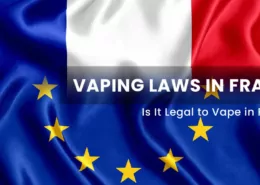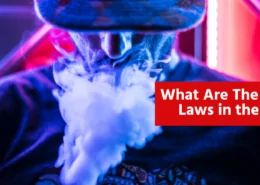Vaping Laws in Canada – Everything You Need to Know
From the bustling streets of Toronto to the scenic coastlines of British Columbia, Canada’s approach to vaping is as diverse as its landscape. The nation has developed a complex, multi-layered regulatory framework for e-cigarettes and related products, for anyone involved in the Canadian vape market – whether as a consumer, retailer, manufacturer, or importer – understanding these evolving laws is not just advisable, it’s essential for legal operation. This guide provides an in-depth look at Canada’s current vaping laws, unpacking the federal, provincial, and municipal rules that govern everything from age restrictions and flavor bans to taxation and advertising.
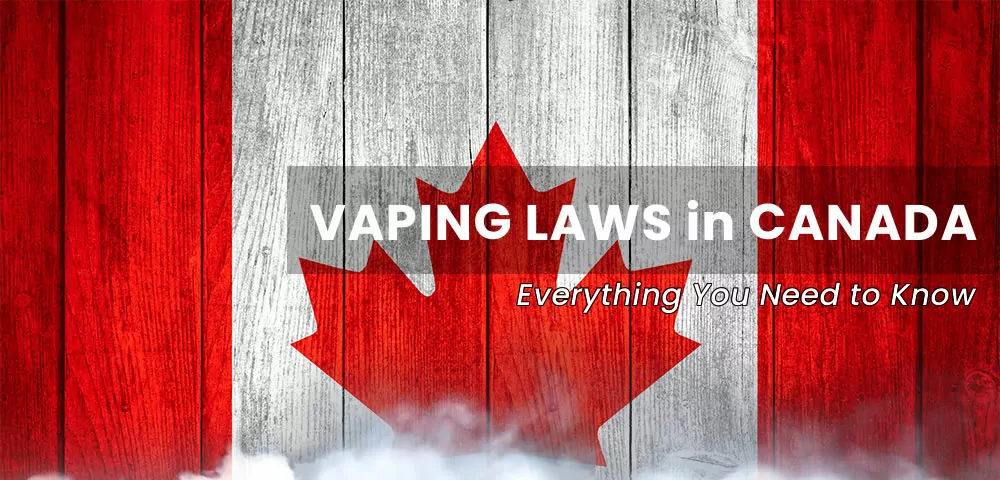
Is Vaping Legal in Canada?
Yes, vaping is legal for adults in Canada. However, it is heavily regulated under the federal Tobacco and Vaping Products Act (TVPA), and further controlled by a patchwork of provincial and municipal laws that dictate the legal age for purchase, where you can vape, what flavors are available, and how products are taxed.
Vaping Statistics in Canada
On May 5th, 2022, Statistics Canada released a report that presented an overview of the Canadian Tobacco and Nicotine Survey (CTNS) conducted in 2021. The purpose of the survey was to collect data on tobacco and nicotine usage in Canada, which included e-cigarettes, cigarettes, and other tobacco and nicotine products. The report highlighted a number of significant findings that were obtained from the CTNS.
- 6% of males and 5% of females vaped in the past 30 days.
- 5% of Canadians aged 15 and older had reported vaping in the past 30 days. Younger Canadians were more likely to have vaped in the past 30 days (13% of youth aged 15 – 19 and 17% of those aged 20 – 24) compared to 4% of Canadians aged 25 and older.
- Vaping to reduce stress was reported as the main reason for vaping among 15-19 years (33%) compared with 58% of those aged 25 and older who reported using vaping to reduce, quit or avoid returning to smoking.

The Federal Tobacco and Vaping Products Act (TVPA)
In May 2018, the Canadian government passed the Tobacco and Vaping Products Act (TVPA), creating a national regulatory framework for the manufacturing, sale, labeling, and promotion of vaping products. This act is the cornerstone of all vaping laws in the country.
Age Restrictions
Under federal law, the minimum age to purchase vaping products is 18 years old. However, this is just the national baseline. As we will see, almost every province and territory has exercised its right to set a higher age limit, making the practical legal age 19 in most of the country (check below).
Vaping Products Labelling and Packaging
The Vaping Products Labelling and Packaging Regulations (VPLPR) impose strict rules to ensure consumer safety and awareness. Key requirements include:
- Child-Resistant Packaging: All vaping products containing nicotine must be sold in packaging that is difficult for children to open.
- Health Warnings: Packages of nicotine-containing products must display a prominent health warning about the addictive nature of nicotine.
- Ingredient Lists: All vaping substances, whether they contain nicotine or not, must include a list of ingredients.
- Nicotine Concentration Statements: The nicotine concentration must be clearly displayed on the packaging.

Furthermore, manufacturers are prohibited from making unsubstantiated health claims, such as suggesting their products are effective for smoking cessation, unless explicitly authorized by Health Canada.
Nicotine Concentration
A crucial federal regulation is the cap on nicotine strength. The Nicotine Concentration in Vaping Products Regulations, effective since July 2021, establish a maximum nicotine concentration of 20 mg/mL for all vaping products manufactured or imported for sale in Canada. This rule was implemented to reduce the risk of accidental nicotine poisoning and to curb the appeal of extremely high-nicotine products.
Vaping Products Advertising and Promotion Restrictions
The Vaping Products Promotion Regulations (VPPR) limit how vaping products can be advertised. It is illegal to promote vaping products in a way that is appealing to or can be seen or heard by young people. This includes bans on advertising in public places like transit shelters, in broadcast media, and on most online platforms that are not robustly age-gated. Permitted advertising is generally restricted to age-gated websites and adult-only retail environments, and even then, it must include prescribed health warnings. At the point of sale in general retail stores, only basic availability and price information is allowed, typically using black text on a white background.
For more details , please read: Vaping Products Promotion Regulations: Information Sheet
Public Space Vaping Bans
The TVPA also amended the Non-smokers’ Health Act to include vaping. This means that vaping is prohibited in all federally regulated workplaces and certain modes of transportation where smoking is also banned, such as planes and trains. This sets a precedent, but the rules for most day-to-day public spaces are determined at the provincial and municipal levels.

ECIGATOR
Ecigator is one of the well-known vape brands spun off from FM Technology Co., Ltd, it’s an ISO-certified disposable vape manufacturer for OEMs, ODMs, and OBM since 2010. The founder team comes from top firms with more than 10 years of experience in the vaping industry and has devoted thousands of hours to providing users with a better and better experience.
The Vaping Laws by Provinces, Territories and Municipal
In addition to the federal regulations, each province and territory in Canada has its own set of laws regulating vaping. Here is a breakdown of the vaping laws in each province and territory:
Legal Age to Purchase Vapes by Province/Territory (as of 2025)
| Province/Territory | Legal Age |
|---|---|
| Alberta | 18 |
| British Columbia | 19 |
| Manitoba | 18 |
| New Brunswick | 19 |
| Newfoundland and Labrador | 19 |
| Northwest Territories | 19 |
| Nova Scotia | 19 |
| Nunavut | 19 |
| Ontario | 19 |
| Prince Edward Island | 21 |
| Quebec | 18 |
| Saskatchewan | 18 |
| Yukon | 19 |
As the table shows, Prince Edward Island has the highest minimum age in the country at 21, while most other jurisdictions have set the age at 19.
Flavor Restrictions by Province/Territory (as of 2025)
This is one of the most significant areas of provincial variation. While a proposed national flavor ban has been repeatedly delayed, many provinces have enacted their own:
| Province/Territory | Flavor Ban Status |
|---|---|
| Quebec, New Brunswick, Nova Scotia, PEI, Northwest Territories, Nunavut | Comprehensive ban on all flavors except tobacco. |
| Ontario | Partial ban: Only tobacco, menthol, and mint flavors allowed in general retail (convenience stores, gas stations). A wider range of flavors is permitted in adult-only, registered specialty vape stores. |
| British Columbia | Partial ban: Only tobacco flavors allowed in all-ages retail stores. A wider range of flavors is permitted in adult-only vape shops. |
| Alberta, Manitoba, Saskatchewan, Newfoundland & Labrador, Yukon | No provincial flavor bans beyond federal regulations. |
Vaping Laws in Quebec
In Quebec, regulations on vaping are similar to those on smoking since 2015. Selling vaping products to people under 18 is prohibited, and now online sales to minors are also illegal. Delivery personnel are required to verify that the buyer is 18 or older.
Moreover, vaping products with candy, dessert, pot, soft drinks, and energy drinks flavors are also banned. These regulations are in addition to existing restrictions on smoking, including where smoking, whether tobacco or e-cigarettes, is not allowed.
The vaping laws in Quebec is Tobacco Control Act. and Sale of tobacco products and smoking bans in Quebec. Under these laws, it’s forbidden to:
- Sale and supply to minors under 18 banned, photo ID required regardless of age;
- Sale banned wherever tobacco sales banned;
- Vaping banned wherever smoking is banned;
- Outdoor signage restricted, shops are only allowed to show availability and price;
- All prohibitions that apply to tobacco promotion also apply to vape shops.
in another words, t’s FORBIDDEN to:
- Allow e-cigarettes and related accessories to be seen from the outside of a shop. To prevent this, you’ll need to frost your window.
- Communicate to consumers inappropriately regarding tobacco products displayed in the shop. This means a seller cannot communicate on the alleged benefits of vaping.
- Advertise a vaping product whose sale or distribution is forbidden. In broad terms, ad in newspapers, posters, leaflets, Facebook posts, or on any other social network are not allowed. Likewise, it is not possible for a vape seller in Quebec to own a website that promotes its products.
- Allow clients to test products or flavours. If you run a vape shop, you can’t allow a potential client test any products nor demonstrate how they work. Both owners and clients complain about this but it’s the law.
- Sell, or offer products other than those related to e-cigarettes. For instance, owners or shop staff cannot offer food or water to clients, neither for free or at a price.
- Offer loyalty cards or any discounts or coupons.
- Sell vaping products, to minors, nor allow their presence within the shop. The client or visitor must prove he is over the age of legal majority. If the seller doubts the age of a visitor, he must ask for ID.
- Fail to display, in full view of everyone, on the cash registers or near them, messaging regarding the ban on the sale of tobacco to minors and the health warnings from the Ministère de la Santé et des Services sociaux
Vaping Laws in British Columbia
In March 2015, the government of British Columbia introduced a bill called the Tobacco Control Amendment Act, 2015 (also known as Bill 14), which initially aimed to prohibit the indoor use of e-cigarettes, restrict the sale of e-cigarettes to individuals under 19 years of age, and limit the advertising and promotion of e-cigarettes. The new law in BC: Tobacco and Vapour Products Control Act in in affect at Sept. 1, 2016.
Under this law, the following are banned:
- Sale and supply to minors (under 19);
- Sales wherever tobacco sales are banned;
- Vaping anywhere (inside public and work places) smoking is banned with the exception of vape shops where minors are not allowed to enter; with a maximum of two people sampling a product at the same time;
- Vaping in cars with children under 16;
- Vaping within six metres of doors, air intakes and open windows;
- Any kind of promotion in stores except point of sale showing availability and price, including duty free shops;
- All point of sale display except where minors are prohibited, permits vending machines in adult only venues, including duty free shops;
- Kindergarten to Grade 12 school sites at all times;
- Ban on health authority property unless in designated areas.
In November 2019, the province of British Columbia in Canada announced new regulations on vaping products. These regulations include higher taxes on vaping products, restrictions on sales and advertising, limits on the amount of nicotine allowed in the products, and constraints on the packaging of these products. The aim of these regulations is to protect public health and reduce the use of vaping products among youth.
- Allow e-cigarettes and related accessories to be seen from the outside of a shop. To prevent this, you’ll need to frost your window.
- Communicate to consumers inappropriately regarding tobacco products displayed in the shop. This means a seller cannot communicate on the alleged benefits of vaping.
- Advertise a vaping product whose sale or distribution is forbidden. In broad terms, ad in newspapers, posters, leaflets, Facebook posts, or on any other social network are not allowed. Likewise, it is not possible for a vape seller in Quebec to own a website that promotes its products.
- Allow clients to test products or flavours. If you run a vape shop, you can’t allow a potential client test any products nor demonstrate how they work. Both owners and clients complain about this but it’s the law.
- Sell, or offer products other than those related to e-cigarettes. For instance, owners or shop staff cannot offer food or water to clients, neither for free or at a price.
- Offer loyalty cards or any discounts or coupons.
- Sell vaping products, to minors, nor allow their presence within the shop. The client or visitor must prove he is over the age of legal majority. If the seller doubts the age of a visitor, he must ask for ID.
- Fail to display, in full view of everyone, on the cash registers or near them, messaging regarding the ban on the sale of tobacco to minors and the health warnings from the Ministère de la Santé et des Services sociaux
Vaping Laws in Ontario
The vaping law in Ontraio is Smoke-Free Ontario Act, 2017, under this law:
- You must be 19 to purchase e-cigarettes and vaping supplies.
- You can not vape in any enclosed workplace, enclosed public place, and all other areas designated as smoke/vape free.
- Sale prohibited wherever tobacco sales are banned.
- Use is for the purpose of sampling a vapour product
- No more than two persons may sample a vapour product at the same time
- Specialty vape stores must provide fresh, one-time use disposable mouthpieces for sampling, unless the electronic cigarette is the personal possession of the person sampling a vapour product.
- The electronic cigarette must not contain Cannabis, Tobacco (i.e. Heat-Not-Burn Tobacco Products), or a Controlled Substance.
Starting from January 1, 2020, promotion of vaping products inside stores will be restricted to specialty vape shops and cannabis retail stores only, and will no longer be allowed in convenience stores and gas stations in Ontario.
Vaping Laws in Alberta
Vaping Laws in Alberta
In Alberta, there is currently no provincial legislation regulating vaping, but some municipalities have implemented their own bylaws to restrict e-cigarette use in public places. The province’s health minister called for a review of tobacco and smoking legislation in October 2019, with a particular focus on regulating vaping.
In June of 2015, the City Council of Calgary implemented a by-law prohibiting the use of e-cigarettes and vaporizers in all public places where tobacco cigarettes are already banned. However, an exemption was made for standalone, enclosed retail vape shops, allowing customers to try out e-cigarettes within their stores.
This means that there are currently no provincial laws prohibiting vaping indoors, including in bars, restaurants, hotels, and other public spaces, unless specified by the individual establishment. It is always a good idea to ask for permission before using your vape in any indoor public area, although this exemption does not apply within the City of Calgary.
Vaping Laws in Manitoba
The Vaping Law in Manitoba is The Non-Smokers Health Protection and Vapour Products Act.
Under this law, the following are banned:
- Vaping in indoor public places like schools, libraries, hospitals, malls, restaurants, indoor workplaces;
- Vaping in cars where children under 16 are present;
- E-cigarette advertising and promotion (similar to bans on advertising on other tobacco products).
The new law also provides exemptions for vaping in the following places:
- Where e-cigarettes are predominately sold;
- Designated smoking/vaping rooms in hotels and group living facilities.
Vaping Laws in Nova Scotia
The vaping laws in Nova Scotia is Smoke-free Places Act (amended) and Tobacco Access Act (amended), Under this law, the following are banned:
- Sale and supply to minors;
- Possession by minors;
- Sale in pharmacies;
- Vaping in any venue where smoking is banned;
- Vaping on school property, in cars with children under 19, on restaurant/bar patios, within four metres of doors, windows and air intakes of workplaces;
- Requirement to display age restriction signage;
- Point-of-sale promotion. (Vape shops are exempt but there is a ban on any promotion from outside the shop.)
In December 2019, Nova Scotia announced a ban on all flavoured e-liquids or vaping products, which is set to come into effect on April 1, 2020. If implemented, this ban will be the strongest of any province in Canada.
Vaping Laws in New Brunswick
On July 1, 2015, the New Brunswick Government amended two acts, the Smoke-Free Places Act and the Tobacco Sales Act, to include e-cigarettes. The Tobacco Sales Act has been renamed as the Tobacco and Electronic Cigarette Sales Act and now includes regulations specific to e-cigarettes. The following rules apply to the sale and use of e-cigarettes:
- Selling e-cigarettes and related products to minors (under 19 years old) is illegal.
- Displaying e-cigarettes and related products in a way that minors can see them is illegal.
- Vaping is prohibited in any place where smoking is prohibited, including workplaces, public places, and vehicles with passengers under the age of 16.
- Vape shops can allow customers to try e-cigarettes and related products, but they cannot be sold to minors.
- All e-cigarettes and related products must be sold in their original packaging with proper labeling.
- Vape shops must be licensed by the province and have strict regulations in place for the storage and sale of e-cigarettes and related products.
Vaping Laws in Saskatchewan
In Saskatchewan, there is currently no provincial legislation on vaping. However, some municipalities have their own bylaws to restrict e-cigarette use in public places.
In November 2019, the province’s health minister announced plans to introduce legislation to regulate the sale and use of vaping products, including a ban on the sale of flavoured vaping products, a limit on nicotine content, and restrictions on advertising and promotion. However, as of early 2023, no such legislation has been passed.
In Saskatoon, vaping is not allowed in places where smoking cigarettes is prohibited by law. However, there is an exemption that allows vaping inside vape shops. It is always a good idea to check with individual establishments before vaping indoors, as some may have their own policies in place.
Vaping Laws in Newfoundland and Labrador
In Newfoundland and Labrador, vaping is prohibited in all indoor public places, workplaces, and vehicles where smoking is also banned. The ban includes all types of e-cigarettes, whether they contain nicotine or not. The province has also restricted the sale of vaping products to minors, and it is illegal to sell e-cigarettes to anyone under 19 years of age. Additionally, all e-cigarette products sold in the province must meet certain labeling and packaging requirements.
The Vaping Laws in Newfoundland and Labrador is Smoke-Free Environment Act, Tobacco and Vapour Products Control Act in effect at June 7, 2016.
Under the law, the following are banned:
- Sale to minors under 19;
- Sale banned wherever tobacco sales banned;
- Point-of-sale promotion, products and promotional materials cannot be visible inside or outside the shop;
- Restrictions on signage inside shops;
- Vape shops only allowed to operate if the only business conducted is the sale of vapour products.
Vaping Laws in Prince Edward Island
As of June 1, 2015, Prince Edward Island implemented a province-wide ban on indoor vaping wherever smoking is also prohibited. This includes public places, workplaces, and vehicles with children under the age of 16. The ban also includes outdoor patios of restaurants and bars. The use of e-cigarettes is still permitted in designated smoking areas in some hotels, long-term care facilities, and psychiatric facilities. It is also allowed in vape shops for the purpose of sampling products. There is a fine for violating the ban.
The Vaping Laws in Prince Edward Island is Tobacco and Electronic Smoking Device Sales and Access Act in effect at Oct. 1, 2015.
Under this law, the following are banned:
- Sale and supply to minors and purchase by minors;
- Sale where tobacco sale is banned;
- Vaping in indoor public spaces and workplaces;
- Vaping in cars with children under 19, on restaurant/bar patios except between 10 p.m. and 3 a.m., within 4.5 metres of doors and air intakes;
- Vaping on construction sites;
- Point of sale promotion and promotion visible from outside retail premises;
- Outdoor signage;
- Any advertising that is misleading regarding the characteristics, health effects and health hazards of these devices.
In Prince Edward Island, new legislation is awaiting royal assent which will raise the minimum age for purchasing vaping products to 21 from 19. This will be the highest minimum age in the country. The legislation will also place restrictions on where vaping products can be sold and ban certain flavours.
Vaping Laws in Northwest Territories
As of now, there are no specific territorial or municipal regulations, laws, or bills related to vaping in the Northwest Territories. This means there are no laws prohibiting vaping indoors in public places such as bars, restaurants, and hotels, unless the establishment has its own rules in place. However, it is always a good idea to ask for permission before using a vape in any indoor public area as a sign of courtesy.
The Smoking Control and Reduction Act passed in August 2019, but is not yet in effect.
And the Banning the Sale of flavoured Vapour Products take effective on March 25, 2022, the sale of flavoured vapour products will be banned in the Northwest Territories.
Vaping Laws in Nunavut
Currently, there are no territorial or municipal regulations/laws/bills for vaping in Nunavut. This means there are no specific restrictions on where vaping can take place, but it is always recommended to ask for permission before vaping in any indoor public area.
In Nunavut, amendments to the Tobacco Control and Smoke-Free Places Act were implemented on September 4, 2018 to prohibit the use of e-cigarettes wherever smoking is prohibited. The specific places where vaping is banned, such as in vehicles with children under 16, may differ across the country and may be covered under various laws and regulations.
Vaping Laws in Yukon
The Tobacco and Vaping Products Control and Regulation Act has been proclaimed by the Government of Yukon and is now in force. This new Act replaces the Smoke-Free Places Act and regulates the use, sale, display and promotion of tobacco and vaping products in Yukon.
A number of changes will immediately take effect, including the following:
- an individual must be 19 years old to sell or to use tobacco and vaping products in Yukon;
- different restrictions will apply regarding the use and promotion of vaping products, similar to the current restrictions regarding tobacco products; and
- signage must include “no vaping” in addition to “no smoking.”
Municipal Vaping Laws
In addition to federal and provincial regulations, many municipalities across Canada have also enacted their own vaping laws. These laws can vary widely, so it’s important to check with your local government to find out the specific regulations in your area.
Some common municipal vaping laws include:
- Prohibiting the use of vaping products in parks and other public spaces
- Banning the sale of vaping products in certain locations, such as near schools
- Requiring retailers to obtain a license to sell vaping products
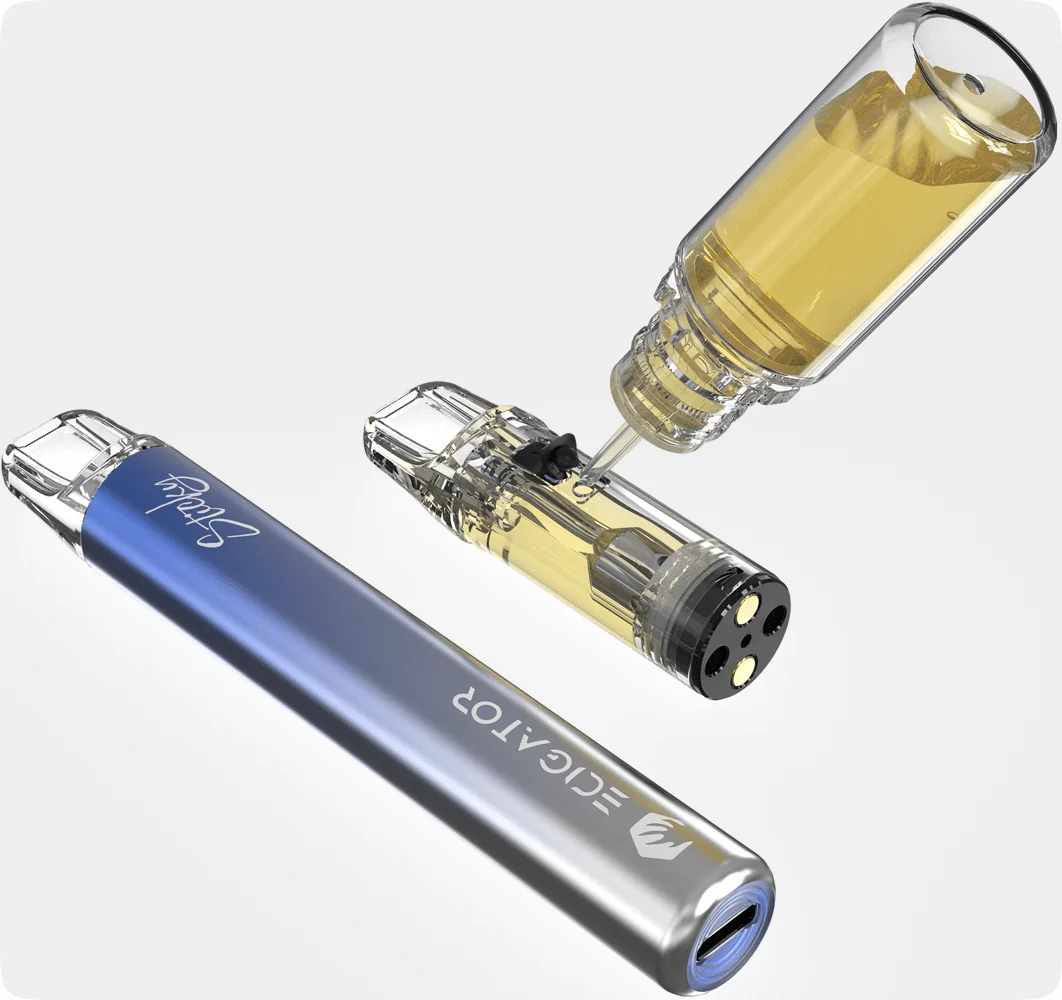
Ecigator Open Pod Kit for Starters
The Ecigator Sticky Refillable Open Pod Kit is a new type of vape device designed for beginners. It features a refillable pod and a rechargeable battery.
This means you don’t need to throw away a disposable prefilled pod — simply refill it instead. Each pod supports approximately 7–8 refills, and you can switch e-liquids to enjoy different flavors.
Vaping Tax in Canada
Effective October 1, 2022, the federal government implemented an excise duty on all vaping liquids (both nicotine and non-nicotine) manufactured or imported in Canada. This tax is applied to the manufacturer or importer and is typically passed on to the consumer, increasing the retail price.
The federal tax rate is structured as follows:
- $1.12 per 2 mL for the first 10 mL of e-liquid in a single container or pod.
- $1.12 per 10 mL for any amount of liquid above the initial 10 mL.
For example, a 30ml bottle of e-liquid would have a federal excise duty of $7.28 ($5.60 for the first 10ml + $1.68 for the next 20ml, based on a slightly different calculation provided in some sources, but the per-mL structure is key). A package of four 1.5ml pods (6ml total) would have a federal duty of $4.48.
As of 2025, many provinces and territories have entered into a coordinated taxation agreement with the federal government. In these jurisdictions (Quebec, Ontario, New Brunswick, Manitoba, PEI, Alberta, Northwest Territories, Yukon, and Nunavut), an additional provincial tax equal to the federal rate is applied, effectively doubling the total excise duty on vaping products sold there.
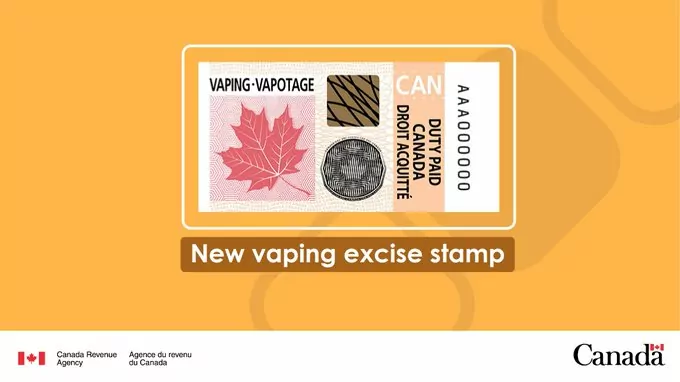
Conclusion
In conclusion, vaping laws and regulations in Canada vary from province to province, with some provinces having stricter rules than others. While some provinces ban flavored e-liquids, others have implemented age restrictions and indoor vaping bans. It is important to stay informed about the vaping laws in your area and to always ask for permission before vaping in any public indoor area. Moreover, the federal government has recently introduced an excise duty on vaping products, which may result in an increase in prices for vapers. As the vaping industry continues to grow, it is expected that more regulations will be introduced in the future.
FAQS
What is the legal age to purchase and use vaping products in Canada?
The legal age varies by province and territory. While the federal minimum is 18, most provinces (like Ontario and British Columbia) have set it at 19. Prince Edward Island has the highest age requirement at 21.
What are the key provisions of the federal Tobacco and Vaping Products Act?
The key provisions include a federal minimum age of 18, strict labeling and child-resistant packaging requirements, a maximum nicotine concentration limit of 20 mg/mL, and significant restrictions on promotion and advertising to protect youth.
Are flavored vapes banned in Canada?
There is no national ban on flavored vapes, but several provinces and territories, including Quebec, Nova Scotia, New Brunswick, and PEI, have banned all flavors except tobacco. Other provinces like Ontario and BC have partial restrictions, limiting flavor sales to specialty vape stores.
Can I use vaping products in public places in Canada?
It depends on the specific regulations in your province, territory, and municipality. Generally, vaping is prohibited in all enclosed public places and workplaces where smoking is also banned. Many jurisdictions also have restrictions on vaping in outdoor public spaces like parks and near building entrances.
Where can I go for more information about vaping laws in Canada?
You should consult the official website of the provincial or territorial Ministry of Health for your specific location, as well as the Health Canada website for federal regulations. Your local municipal government website will have information on any local bylaws.
- Mexico Passes Law to Ban Tobacco Ads, Expand Smoke-Free Zones - August 13, 2025
- Big Vape Brands Bypass Ad Bans Via Global Social Media - August 13, 2025
- UK to Make Vape Sellers Pay for E-Waste Disposal - August 13, 2025

